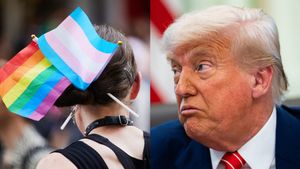Before his run for president, Donald Trump was a bit more liberal, telling Meet the Press in 1990 that though abortion made him cringe, he was pro-choice.
Since that time, his views have "evolved" (or devolved) to represent a more conservative religious perspective, further evidence of which came in comments made by his running mate, Mike Pence, Tuesday during the vice-presidential debate.
The right-wing, anti-LGBT governor of Indiana let it be known that he tries to "spend a little time on my knees every day." For Pence, an evangelical Christian, "it all for me begins with cherishing the dignity, the worth, the value of every human life," he said.
Earlier this year, Pence signed a state law that would have prohibited abortion in cases of fetal abnormality and require burial or cremation of fetal remains. Women of Indiana become so outraged they launched the hashtag #PeriodsForPence, updating the governor on their uterine functions in graphic detail as protest. A federal court found the law unconstitutional -- in conflict with the rights established in the Supreme Court's 1973 Roe v. Wade ruling -- and blocked it from going into effect.
Trump has pledged that his appointments to the Supreme Court and other federal courts will be conservatives in the mold of the anti-abortion, anti-LGBT Antonin Scalia, so with three high court justices in their 80s and a vacant seat to fill because of Scalia's death, it's not hard to imagine a Trump presidency drastically changing the laws of the land.
Journalist Michelle Goldberg has called Pence "the most fanatical abortion opponent ever to appear on a presidential ticket." During the debate he said he was "proud to be standing with Donald Trump, who's standing for the right to life. It's a principle that -- Sen. Kaine -- and I'm very gentle about this, because I really do respect you -- it's a principle that you embrace."
Kaine, who describes himself as a devout Roman Catholic, explained the difference between his ticket and Pence's was that he and Clinton would not codify their personal beliefs. For example, Kaine, who is personally against the death penalty, explained he had no problem enforcing it when he was governor of Virginia. "I looked the voters of Virginia in the eye and said, look, this is my religion. I'm not going to change my religious practice to get one vote, but I know how to take an oath and uphold the law," he said.
While democratic, this stance may also be problematic for certain voters who view issues such as abortion access, the treatment of LGBT people and the death penalty as human rights concerns.
Though it is Kaine's job to uphold the will of the people, what happens if that will is itself unjust? Think back to Jim Crow laws, wherein the U.S. codified racism. And Kaine may claim his personal opinions do not impact his legislative decisions, but he has supported the Hyde Amendment, a federal law that bans the use of taxpayer funds for abortion. Clinton does not support this law.
But while nether Kaine nor Clinton may be as wholeheartedly supportive of abortion rights as, say, Cecile Richards, president of Planned Parenthood, their ticket is far more likely to ensure the continued existence of rights established under Roe.
Kaine did not lie about his personal beliefs; rather, he indicated they were secondary to the championing of women's rights. "We can encourage people to support life," Kaine said during the debate with Pence. "But why don't you trust women? Why doesn't Donald Trump trust women to make this choice for themselves?"
Back to when Trump was pro-choice:














































































